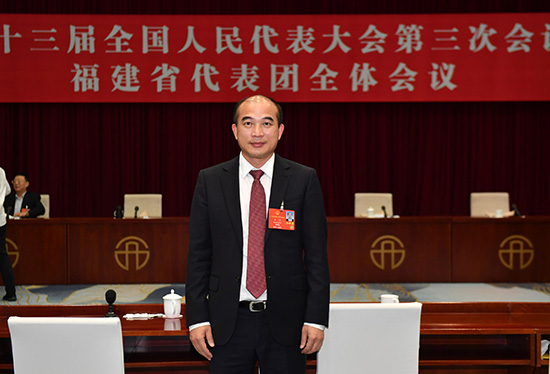
Hong Jie, Deputy to the National People's Congress and Chairman and President of SKSHU Paint Co., Ltd.
Photo by Zhang Yongding, Fujian Daily
(Source: www.people.com.cn) Beijing, May 25 (Reporter: Bi Lei) "Up to now, although China's vocational education has made great progress, there is still a big gap compared with the requirements of the national strategy and economic and social development. Vocational education remains the weak link in the education industry." At this year's Two Sessions, Hong Jie, Deputy to the National People's Congress and Chairman and President of SKSHU Paint Co., Ltd., put forward the suggestions on speeding up the implementation of the national vocational education reform plan to promote industrial transformation and upgrading and boost employment.
Hong Jie said that the problem of focusing only on general education while ignoring vocational education was a serious problem in the society, and large enterprises were not active in participating in vocational education; as a result, most traditional vocational colleges were still faced with problems such as lack of students, poor teaching quality, and limited job opportunities for graduates. To overcome the hardship in the implementation of vocational education policies was still a major problem for governments at all levels to solve, he said.
According to Hong, the main difficulties in delivering vocational education policies were as follows: first, the status of vocational education was not fully recognized by the society; second, the quality of teachers in vocational colleges was not high; third, supply and demand were mismatched; fourth, the state lacked policy guidance for the new generation of vocational jobs and the certification system of vocational certificates was relatively fragmented; fifth, the business sector was not active in participating in vocational education; sixth, the problem of multiple command centers still existed in the field of vocational education, and a sound coordination mechanism was yet to be established.
For the purpose of speeding up the implementation of the national vocational education reform plan to promote industrial transformation and upgrade and boost employment, Hong Jie suggested increasing the publicity of vocational education, improving the social status and income of skilled workers trained for modern jobs, and guiding more promising students to realize their life dreams through vocational education; and boosting the social status and income of vocational education teacher to match the level of regular universities. For well-managed vocational education schools, the benefits provided to teachers might even exceed that of ordinary universities, so as to attract more outstanding teachers to join the cause of vocational education and promote the building of the "double-qualification" teacher system.
Leading industrial enterprises should be guided to participate in the building of vocational schools and the integration of industry and education. For leading enterprises that participate in the running of vocational schools, the government should help them apply for secondary and higher vocational education qualifications, provide necessary support in taxation, land, introduction of vocational education professionals (settlement, children's education, professional title certification, etc.), policy-based subsidies, etc., and promote the integration of industry and education with the support of businesses.
The vocational skills appraisal institutions, which are currently randomly distributed in the society, should be consolidated into a number of local vocational education schools to facilitate the implementation of the "1+X certificate system", and the tuition fees of vocational education schools should be raised to help them transition into schools running on market principles; an inter-agency mechanism comprising of the Ministry of Education, the Ministry of Human Resources and Social Security, the Ministry of Industry and Information Technology, the Ministry of Finance, the National Development and Reform Commission and other relevant ministries, should be established to jointly issue more coordinated policies, guide local government departments to set up joint working groups, introduce feasible local vocational education reform programs, and speed up the implementation of the national vocational education reform plan.
Efforts should be made to speed up the upgrade of the profession and certification systems of the national occupation catalogue, include the new professions created in the modern manufacturing and service industries into the occupation catalogue, and organize top enterprises to develop occupational standards, issue the management rules on practitioner qualifications to the whole society, and push for the establishment of mandatory licensing requirement for practitioners. For enterprises that are capable of developing certification standards for their own specific types of jobs, they should be given recognition and protection of intellectual property rights and certification rights at the national level, so as to encourage more enterprises to participate in the construction of job designing and education certification systems. On this basis, the transition from traditional to modern vocational education should be advanced to better match supply with demand.
"On the basis of the accelerated implementation of the above-mentioned national vocational education reform, the enrollment of higher vocational colleges will be notably expanded, and worker skills upgrading and training will be substantially increased. This will significantly lessen the pressure on employment in the coming one or two years," Hong Jie said.









 Tel:
Tel: Email:
Email: Address:
Address:





